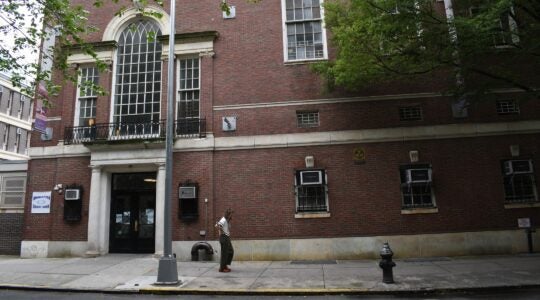Candlelighting, Readings:
Shabbat candles: 6:46 p.m.
Torah: Exodus 35:1- 40:38; Numbers 19:1-22
Haftarah: Ezekiel 36:16-38
Havdalah: 7:46 p.m.
“Bezalel made the ark… He made two cherubs of gold … at the two ends of the cover. … The cherubs had their wings spreading out upwards … with their faces turned towards each other…” [Exodus 37:1-9]
This week’s biblical portion repeats the detailed construction of the Tabernacle, including the Holy Ark’s protective cover that featured the two winged cherubs facing each other. In the portion of Terumah, the Torah noted: “It is there I will set My meetings with you, and I shall impart to you — from above the cover and from between the two cherubs who are above the Ark of the Covenant — everything that I will command to the children of Israel” [Ex. 25:22]. Thus, God spoke to Moses from between the cherubs.
The Bible insists that from the time of the Divine Revelation at Sinai the Almighty continues to communicate with us in “a great voice that never ceases.” The Ramban says that the Tabernacle was a continuation of the revelation on Sinai.
Where does that leave us today? How do we hear God without the Tabernacle, and without a Holy Temple? Who speaks for God when there are no prophets, when there is no Sanhedrin whose Sages were infused with some of the Divine Spirit? How does God communicate with us today?
I believe the symbol of the cherubs will help us to find our answer: God communicates through people. After all, did not the Almighty create the mortal in His own Divine Image [Gen 1:27]? Does not the Bible picture the Divine act of creation as God’s “breathing [in-spiriting]” into the dust of earth the breath [nishmat, soul] of life”, and does not the Sacred Zohar make the point that “everyone who exhales, who breathes out, exudes the inner essence of Himself, as it were”?! Hence there is a trace of God within each and every one of us — and it is that Godliness within which reaches out and communicates to us.
You will remember that when Joseph searched for his brothers, an unnamed person pointed where they had gone. Rashi suggests that this anonymous man was the angel Gabriel (Gavri-El), literally a man of God. The Ramban adds that he was merely a mortal, probably unaware of the function he was performing but, thanks to him, Joseph — and the entire family of Israel — realized their destiny through the Egyptian slavery and exodus.
Rabbenu Tzadok, the famed Pri Tzaddik of Lublin, records how he learned one of the most important lessons of his life from a Gentile Polish peasant whose wagon had collapsed. The peasant asked him to help to gather the hay that had fallen to the ground. “I can’t,” said the Pri Tzaddik. “You mean you won’t,” said the peasant. “If you wanted to, you could.”
As he helped the peasant gather the hay, the rabbi felt the great importance of the lesson God had taught him through the mouth of this peasant. Our challenge is to sensitize our hearts, minds and souls to every one of our human encounters — and to listen for the emanations of the Divine messages.
Many years ago, I was invited to speak in a synagogue in Munich. The congregation consisted of approximately 150 Polish Jews, survivors of the Holocaust who, after being in DP camps outside Munich, remained in Germany to begin new families and businesses.
It was the strangest congregation that I have ever encountered. It was not only that people were engaged in conversation during the prayers; they acted as if there wasn’t a synagogue service being conducted in the room at all. They walked around, conversed, and called out to friends from the windows. And although they were respectfully silent for the 15 or 20 minutes that I spoke, I could not understand why they came to shul!
My host gave me the answer. “Every one of them lost most if not all of his family in the Holocaust. They cannot live with God and they cannot live without God. They are traditional Jews, so they come to synagogue, but it is as if they are on strike: they speak to each other but not to God. They are too angry to speak with him. And they let Him know how angry they feel by speaking to each other when the service dictates they should be speaking to Him!’
I think about this synagogue a great deal. I even admire their faith; after all, if they questioned God’s existence, they couldn’t be angry at Him. I even believe God loves their “prayers.” Does not God Himself say according to the Midrash Rabbah, “Would that you forget about Me and remember my children.”
Rav Haim Vital teaches that when we enter the synagogue to pray, we must intone the verse, “You shall love your friend as yourself,” since closeness to God must bring us close to all humanity, to all God’s children. As the anonymous poet wrote: “I looked for myself and could not find me / I sought my God and couldn’t find Thee / I reached out to others and found all three.”
Rabbi Shlomo Riskin is chancellor of Ohr Torah Stone and chief rabbi of Efrat.
The New York Jewish Week brings you the stories behind the headlines, keeping you connected to Jewish life in New York. Help sustain the reporting you trust by donating today.




